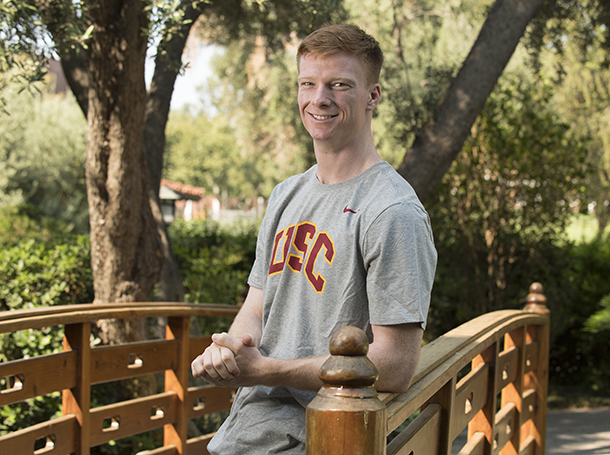From the age of 6, Mich Hamlin remembers being homeless.
In fact, he doesn’t ever remember not living on the streets of Southern California with his parents and two brothers. To Hamlin — now 24 and about to enter USC’s physical therapy program this fall — it was a normal existence.
“I guess I was so accustomed to our living situation that I never really processed that, ‘Oh, kids actually go home and have a bed, a shower and warm food on the table every night,’ ” he explained.
Hamlin’s family never slept in the same place because his parents, both unemployed substance abusers, were suspicious of authorities. As a result, they rotated from parks to behind dumpsters to available cars, using blankets a local thrift store provided.
“In my head, it ended up turning into a game of not getting caught,” he said.
Life on the streets
A typical day at the park would start around 3 a.m. when Hamlin and his brothers would wake up and use cardboard to block the sprinklers from getting their mother wet as she slept. “We’d go back to sleep and when the sun rose, we’d load up our belongings onto our dad’s bike and push it to the gas station down the street where we’d shower by the sink. Then our parents would drop us off for school.”
The boys received breakfast and lunch at school, eating as quickly as possible so they could re-enter the line for seconds or secure food to bring with them. Each Friday, their teachers would fill backpacks with items such as Spam, canned hot dogs, granola bars, juice and water to ensure they were fed through the weekend.
The turning point
Then in December 2005, when Hamlin was in seventh grade, his mother showed up at school and a front office worker smelled alcohol on her. The cops were called, Hamlin’s mother was arrested and the kids were placed in foster care.
“We were under the assumption my dad would figure it out, that this is just somewhere temporary to stay,” Hamlin recalled. “Unfortunately, that never occurred.”
Two months later, Hamlin’s mother passed away from liver failure, and the boys remained in foster care permanently.
Though Hamlin struggled academically throughout middle school, receiving all Cs and Ds, everything changed after he was introduced to track and field in high school.
“Every time I ran, I always thought, ‘This is for my mom.’ I used her as a motivational factor to push myself. My coach would tell me, ‘If you want to stay here, you have to do good in the classroom.’ Then I started focusing on school. I noticed the harder I worked on the track, the easier the classroom got. It was an outlet. It gave me the discipline to stay focused and make goals.”
Beating the odds
Hamlin’s coach also convinced him to apply to college and he was accepted at Cal Poly Pomona, where he majored in kinesiology.
“Anatomy was my favorite class in high school,” he said. “My teacher said there were professions in the field working with the body and possibly sports/athletes. After an extensive chat with my coach, physical therapy was the profession I set my sights on. My experiences interning have been nothing short of rewarding — rehabilitating individuals to a better lifestyle. There is nothing more rewarding than helping someone else.”
In addition to being the first person in his family to attend college, Hamlin graduated with honors. It’s quite an accomplishment given that 3 percent of foster kids graduate college and only a fraction of them go on to get an advanced degree. With the help of a Chafee Grant that assists foster youth and a Pell Grant, Hamlin graduated debt free.
Joining the Trojan Family
The next chapter of his life — becoming a Trojan — fills Hamlin with pride. When searching for doctoral institutions, he felt a strong need to put his name on something bigger than himself. “It’s time for me to grow, and what a better place to grow than the number one institution in the nation for my program? I’m looking forward to meeting all of the other students and potential colleagues and networking experiences with the faculty.”
Making mom proud
Once he enters the physical therapy field, Hamlin plans to help those who are in a similar situation as he was as a child. Whenever he sees people asking for money on a freeway off-ramp, it pulls at his heartstrings.
“That used to be my parents,” he said. “No one should have to go through anything close to what I’ve gone through. I want to give back to the foster youth programs. I wouldn’t be where I’m at if it weren’t for their contributions and acts of kindness.”
When Hamlin dons his white coat for the first time at his upcoming ceremony, there will be one person especially on his mind that day.
“I just know that if my mom were there, she would be extremely proud to see all the hardships I’ve been through and the ways I’ve managed to persevere, be resilient and put myself out there to find ways to succeed.”
— Michelle McCarthy


